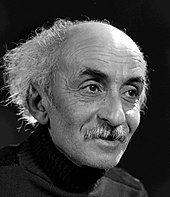Nima Yushij
| Nimā Yushij نیما یوشیج |
|
|---|---|
 |
|
| Born |
12 November 1895 Yush, Nur, Mazandaran, Iran |
| Died | 6 January 1960 (aged 64) Shemiran, Tehran, Iran |
| Occupation | Poet |
| Parent(s) | Ibrahim Nuri (Father) |
Nimā Yushij (Persian: نیما یوشیج) (November 12, 1895 – January 6, 1960), also called Nimā (نیما), born Ali Esfandiāri (علی اسفندیاری), was a contemporary Persian and Tabarian poet who started the she’r-e now (شعر نو, "new poetry") also known as she’r-e nimaa'i (شعر نیمایی, "Nimaic poetry") trend in Iran. He is considered as the father of modern Persian poetry.
He died of pneumonia in Shemiran, in the northern part of Tehran and was buried in his native village of Yush, Nur County, Mazandaran, as he had willed.
He was the eldest son of Ibrahim Nuri of Yush (a village in Baladeh, Nur County, Mazandaran province of Iran). He was a Tabarian but had also Georgian roots. He grew up in Yush, mostly helping his father with the farm and taking care of the cattle. As a boy, he visited many local summer and winter camps and mingled with shepherds and itinerant workers. Images of life around the campfire, especially those emerging from the shepherds' simple and entertaining stories about village and tribal conflicts, impressed him greatly. These images, etched in the young poet's memory waited until his power of diction developed sufficiently to release them.
Nima's early education took place in a maktab. He was a truant student and the mullah (teacher) often had to seek him out in the streets, drag him to school, and punish him. At the age of twelve, Nima was taken to Tehran and registered at the St. Louis School. The atmosphere at the Roman Catholic school did not change Nima's ways, but the instructions of a thoughtful teacher did. Nezam Vafa, a major poet himself, took the budding poet under his wing and nurtured his poetic talent.
...
Wikipedia
